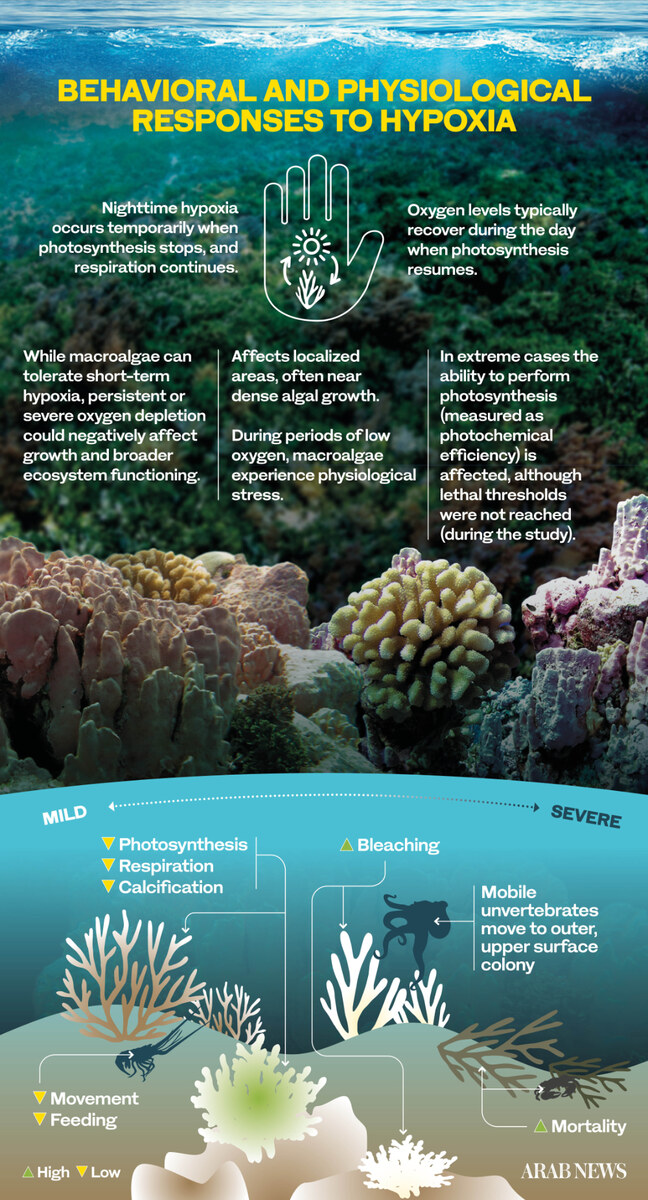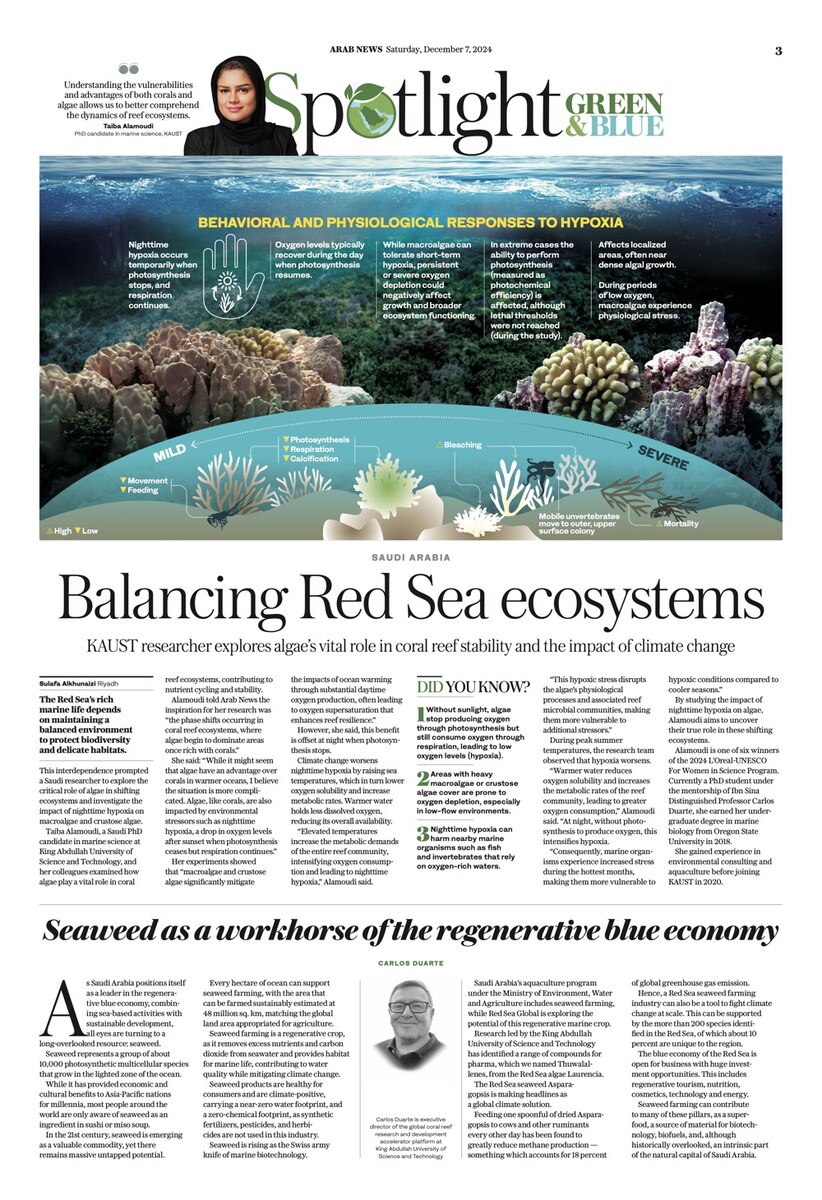RIYADH: The Red Sea’s rich marine life depends on maintaining a balanced environment to protect biodiversity and delicate habitats, with the survival of each species closely tied to the health of its surroundings.
This interdependence prompted a Saudi researcher to explore the critical role of algae in shifting ecosystems and investigate the impact of nighttime hypoxia on macroalgae and crustose algae, especially during the hot summer months.
Taiba Alamoudi, a Saudi PhD candidate in marine science at King Abdullah University of Science and Technology, and her colleagues examined how algae play a vital role in coral reef ecosystems, contributing to nutrient cycling and stability.
However, climate change has been linked to ocean warming and deoxygenation, causing greater stratification and reduced oxygen solubility, which ultimately harm algal health.
Alamoudi told Arab News that the inspiration for her research, titled “Impacts of Climate Change and the Biotechnological Potential of Seaweed,” was “the phase shifts occurring in coral reef ecosystems, where algae begin to dominate areas once rich with corals.”
She said: “While it might seem that algae have an advantage over corals in warmer oceans, I believe the situation is more complicated. Algae, like corals, are also impacted by environmental stressors such as nighttime hypoxia, a drop in oxygen levels after sunset when photosynthesis ceases but respiration continues.”
Alamoudi’s research seeks to “explore what a balanced ecosystem should look like amid climate change” and deepen understanding of the vulnerabilities and strengths of both corals and algae.
This insight, she said, provides a deeper understanding of reef ecosystem dynamics and supports the development of more effective strategies to preserve their balance and health for the future.

The two main criteria for the studied species were their association with reefs and the limited research on them in the Red Sea region.
“Specifically, we placed special emphasis on crustose coralline algae due to their critical role in reef-building and maintenance,” Alamoudi said.
“These algae deposit calcium carbonate in their cell walls, effectively acting as natural cement that strengthens reef structures and provides essential substrates for coral larvae to settle and grow.”
The researchers used “gas buffering” methods to simulate natural reef oxygen dynamics and replicate nighttime hypoxia.
“By bubbling the seawater stock with the specific concentrations of oxygen, carbon dioxide, and nitrogen gases, we can adjust the dissolved oxygen and pH levels in our setups to the required experimental levels.”
The study also measured metabolic respiration rates, oxygen production, photosynthetic efficiency, and metabolomic processes to assess the impact on algal health and functionality.
In addition, Alamoudi said, “we examine changes in their associated microbial communities and observe visual cues like discoloration or tissue degradation.”
The experiments’ results showed that “macroalgae and crustose algae significantly mitigate the impacts of ocean warming through substantial daytime oxygen production, often leading to oxygen supersaturation that enhances reef resilience.”
However, she said, this benefit is offset at night when photosynthesis stops.
Climate change worsens nighttime hypoxia by raising sea temperatures, which in turn lower oxygen solubility and increase metabolic rates. Warmer water holds less dissolved oxygen, reducing its overall availability.
“Elevated temperatures increase the metabolic demands of the entire reef community, intensifying oxygen consumption and leading to nighttime hypoxia,” Alamoudi said.

“This hypoxic stress disrupts the algae’s physiological processes and associated reef microbial communities, making them more vulnerable to additional stressors.”
She added: “While they help maintain current reef conditions, prolonged nighttime hypoxia compromises their ability to support reef expansion and long-term ecosystem vitality.
“Understanding the balance between their daytime benefits and nighttime vulnerabilities is crucial for defining a truly balanced ecosystem.”
During the day, photosynthesis by algae produces oxygen that helps offset increased consumption. “However, at night, no new oxygen is produced while organisms continue to consume it at elevated rates,” said Alamoudi.
“This combination of decreased oxygen solubility, increased metabolic demand, and reduced oxygen production exacerbates nighttime hypoxia, making it a significant stressor intensified by climate change.”
During peak summer temperatures, the research team observed that hypoxia worsens.
“Warmer water reduces oxygen solubility and increases the metabolic rates of the reef community, leading to greater oxygen consumption,” Alamoudi said. “At night, without photosynthesis to produce oxygen, this intensifies hypoxia.
DID YOU KNOW?
1. Without sunlight, algae stop producing oxygen through photosynthesis but still consume oxygen through respiration, leading to low oxygen levels (hypoxia).
2. Areas with heavy macroalgae or crustose algae cover are prone to oxygen depletion, especially in low-flow environments.
3. Nighttime hypoxia can harm nearby marine organisms such as fish and invertebrates that rely on oxygen-rich waters.
“Consequently, marine organisms experience increased stress during the hottest months, making them more vulnerable to hypoxic conditions compared to cooler seasons.”
Moreover, Alamoudi’s research shows how changes in the health of macroalgae and crustose algae can have cascading effects on marine organisms, particularly herbivorous species and invertebrates, potentially impacting their population.
“Coralline algae are crucial for coral larval settlement. Their decline could hinder coral recruitment and reef regeneration,” she said. “This, in turn, affects species dependent on healthy coral reefs for habitat, potentially reducing biodiversity and altering the ecosystem’s balance.”
By studying the impact of nighttime hypoxia on algae, Alamoudi aims to uncover their true role in these shifting ecosystems.
She said her research helps scientists “explore what a balanced ecosystem should look like amid climate change,” noting that “understanding the vulnerabilities and advantages of both corals and algae allows us to better comprehend the dynamics of reef ecosystems and develop more effective strategies to preserve their balance and health for the future.”

One of the biggest challenges Alamoudi and her colleagues faced in this research was the need for continuous monitoring, as even slight fluctuations can greatly impact dissolved oxygen and pH levels.
She added that “collecting samples from deeper ocean zones demanded substantial technological resources.” However, her team’s collaboration with the Saudi National Center for Wildlife enabled them to “access these depths and gather the necessary data and specimens.”
Alamoudi said she found it interesting how mesophotic coralline algae, which live in deeper, lower-light reef zones, respond differently from shallow-water species.
“Even short-term hypoxic stress at the microscale can have substantial impacts, potentially leading to significant ecological consequences that are not yet widely studied,” she said.
“This highlights the importance of examining subtle environmental stressors across different habitats, as they may reveal vulnerabilities in marine ecosystems that could affect overall reef health and resilience.”
Alamoudi is one of six winners of the 2024 L’Oreal-UNESCO For Women in Science Program. Currently a PhD student under the mentorship of Ibn Sina Distinguished Professor Carlos Duarte, she earned her undergraduate degree in marine biology from Oregon State University in 2018.
She gained experience in environmental consulting and aquaculture in the Kingdom before joining KAUST in 2020.
































